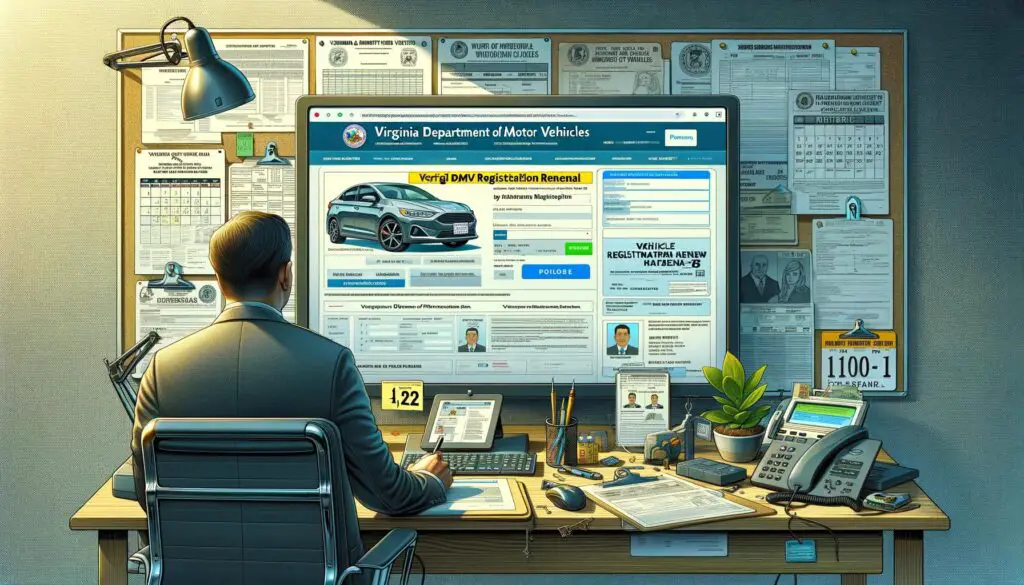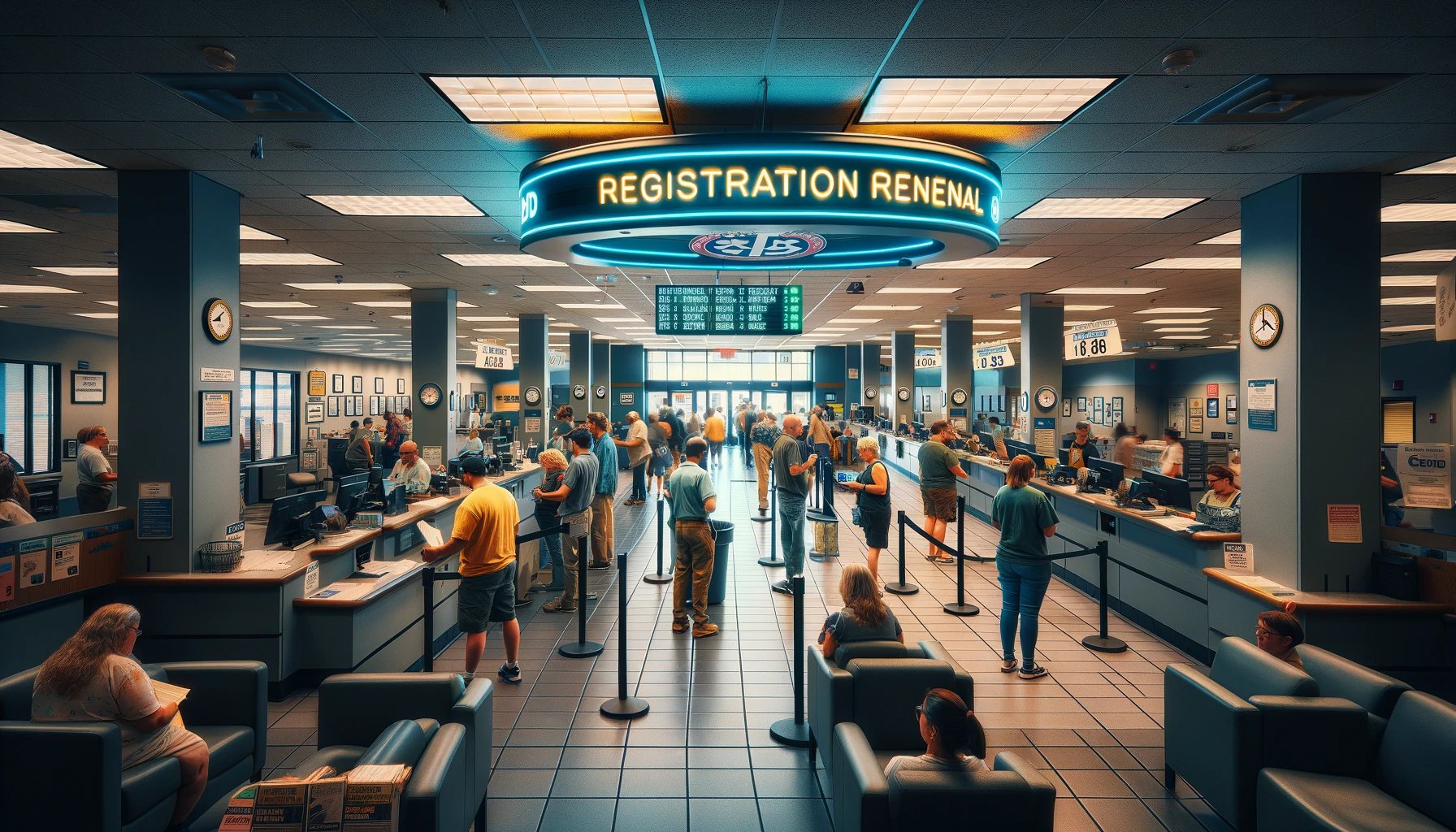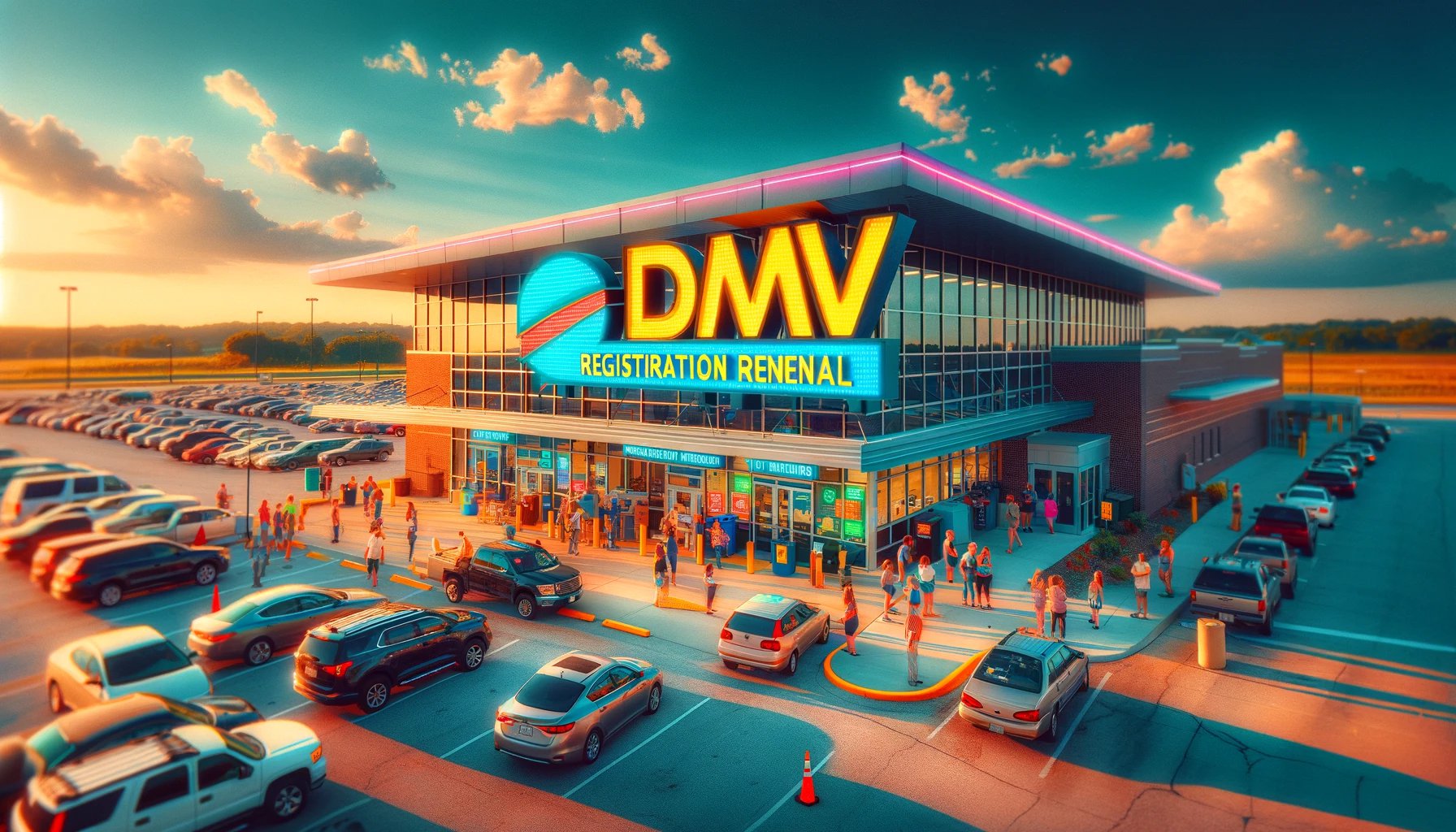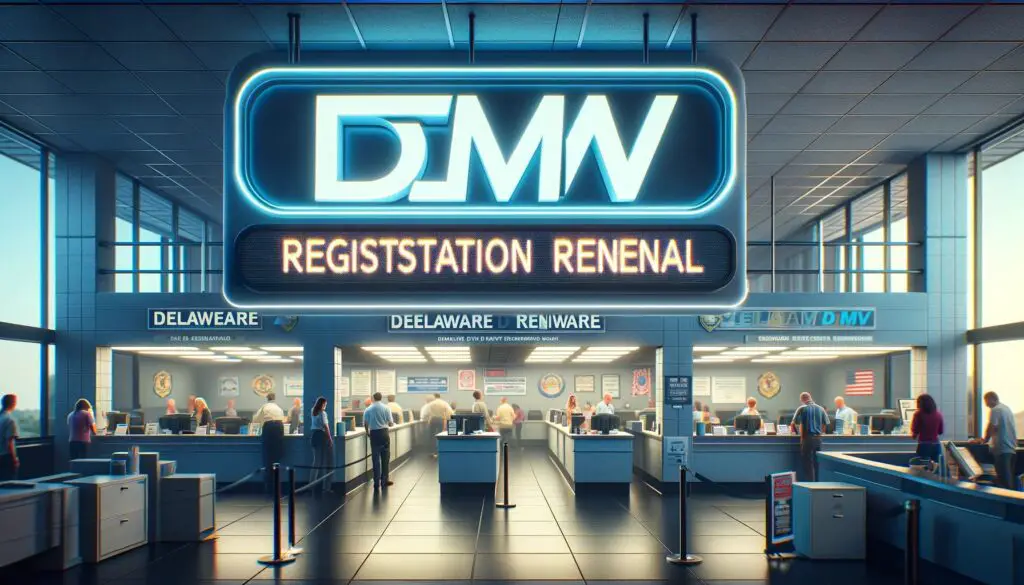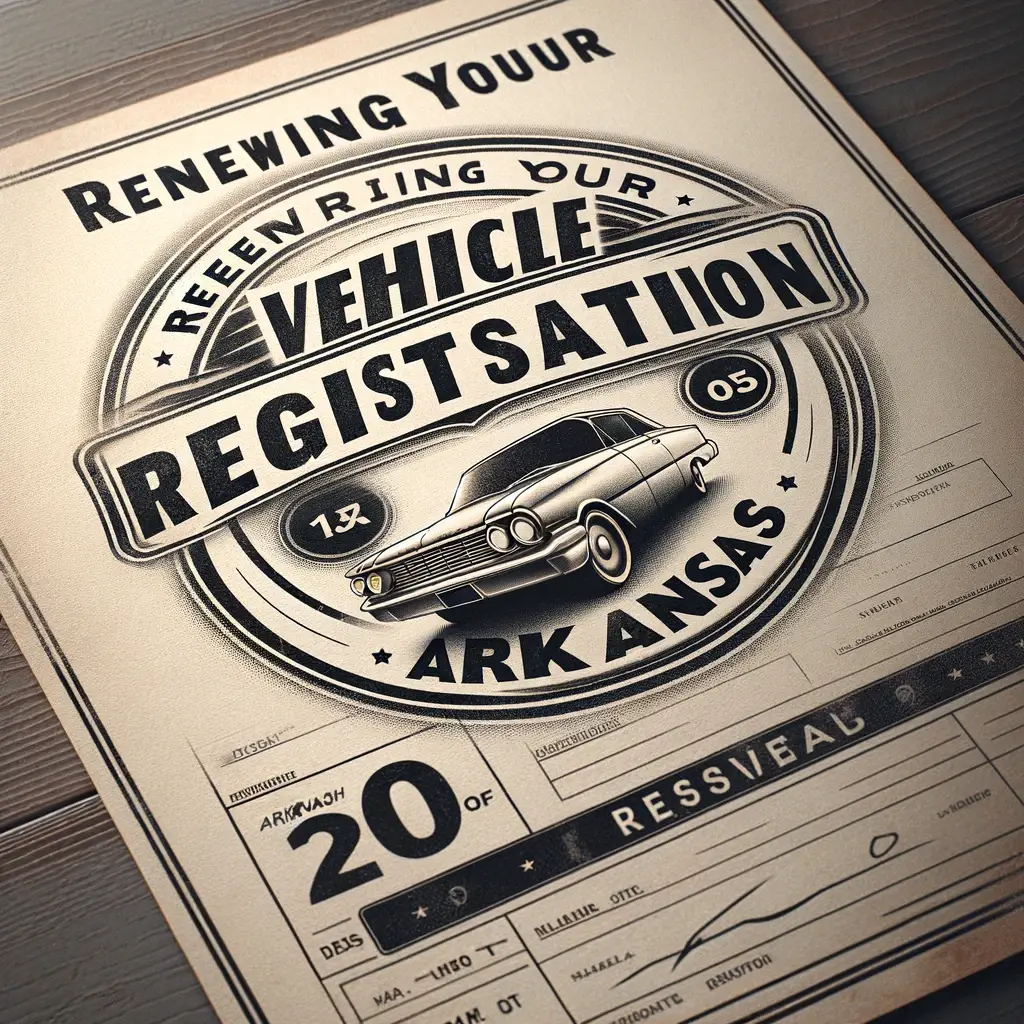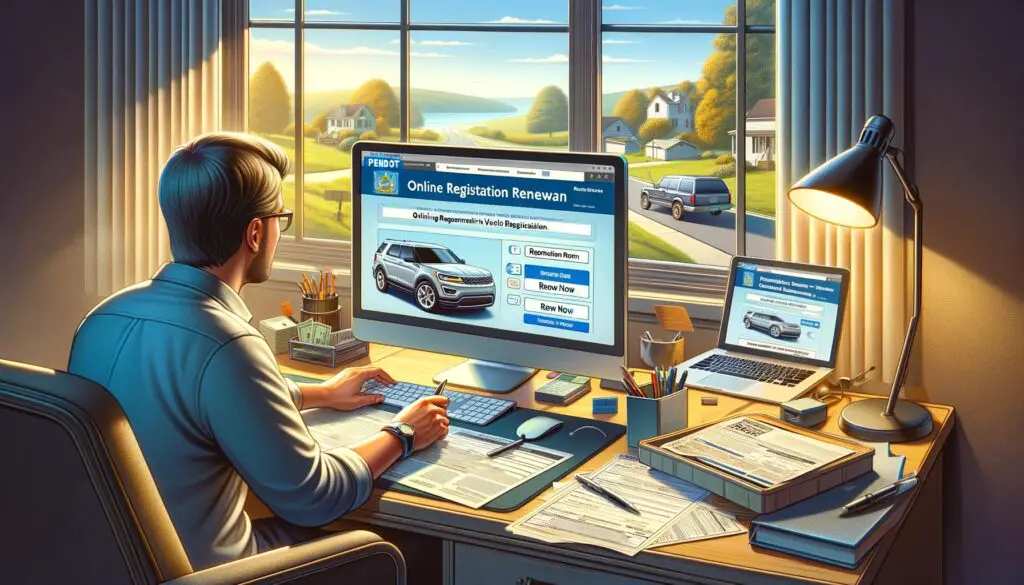Welcome to our comprehensive guide to Virginia DMV registration renewal. In this detailed article, we’ll walk you through everything you need to know to ensure a seamless renewal process, from understanding the importance of renewal to exploring various renewal methods and addressing common mistakes.
Importance of DMV Registration Renewal
Renewing your vehicle’s registration in Virginia is a critical responsibility for all vehicle owners. Beyond being a legal requirement, it serves as a fundamental aspect of ensuring hassle-free driving experiences and maintaining road safety. Here’s an in-depth exploration of why DMV registration renewal is essential:
Legal Compliance and Avoiding Penalties
- Legal Obligation: Under Virginia state laws, all motor vehicles must have valid registration to operate legally on public roads.
- Fines and Penalties: Operating a vehicle with expired registration can result in hefty fines, penalties, and citations from law enforcement officers.
- Impoundment: In severe cases, vehicles with expired registration may face impoundment, leading to significant inconvenience and costs for the owner.
Contribution to Road Safety
- Identification and Accountability: Current registration helps authorities identify vehicles and hold their owners accountable for any violations or accidents.
- Vehicle Maintenance Standards: The registration renewal process often involves ensuring that vehicles meet safety and emissions standards, contributing to overall road safety.
- Updated Information: Renewed registration ensures that the DMV and law enforcement agencies have accurate information about vehicle ownership and status, facilitating smoother operations and investigations.
Financial Implications
- Avoiding Late Fees: Timely renewal helps vehicle owners avoid late fees, which can accumulate over time and become a significant financial burden.
- Insurance Coverage: Some insurance policies may require vehicles to have current registration for coverage to remain valid. Failure to renew could lead to gaps in coverage and potential liabilities in the event of an accident.
- Resale Value: Vehicles with up-to-date registration typically command higher resale values, as buyers perceive them as well-maintained and legally compliant.
Convenience and Peace of Mind
- Uninterrupted Driving: Renewed registration ensures uninterrupted driving privileges, eliminating the risk of being pulled over or facing legal consequences while on the road.
- Efficient Transactions: Having current registration facilitates smooth transactions, such as vehicle inspections, renewing license plates, and transferring ownership.
- Legal Protection: Maintaining current registration provides legal protection to vehicle owners in case of disputes or legal proceedings related to their vehicles.
Environmental Considerations
- Emissions Compliance: Registration renewal often involves ensuring that vehicles meet emissions standards, contributing to efforts to reduce air pollution and protect the environment.
- Encouraging Compliance: By incentivizing compliance with emissions regulations through registration renewal, the state promotes environmentally friendly practices among vehicle owners.
- Public Health Benefits: Reduced vehicle emissions resulting from compliance with emissions standards contribute to improved air quality and public health outcomes for communities.
Understanding Virginia DMV Registration
DMV registration in Virginia encompasses the process of obtaining and renewing permits and documentation necessary for legally operating a vehicle within the state. This comprehensive process serves several crucial functions, aiding in vehicle tracking, ensuring safety compliance, and promoting environmental standards. Here’s a detailed overview:
Permit and Documentation Acquisition
- Initial Registration: When a vehicle is first purchased or brought into Virginia, owners must register it with the Department of Motor Vehicles (DMV). This involves submitting relevant documentation, such as proof of ownership, vehicle identification number (VIN), and proof of insurance.
- Renewal Process: Registration renewal occurs periodically, typically annually or biennially, depending on the vehicle type and registration cycle. Owners must update their registration to maintain legal compliance and driving privileges.
Vehicle Tracking and Accountability
- Identification Purposes: Each registered vehicle is assigned a unique registration number, allowing authorities to identify and track it effectively. This aids in law enforcement, taxation, and public safety efforts.
- Ownership Verification: Registration documents contain crucial information about vehicle ownership, facilitating transactions such as vehicle sales, transfers, and loans. They serve as legal proof of ownership and responsibility.
Safety and Environmental Compliance
- Safety Standards: During the registration process, vehicles may be subject to safety inspections to ensure they meet minimum safety standards. This includes checks for brakes, lights, tires, and other essential components.
- Emissions Testing: Many vehicles are also required to undergo emissions testing to assess their environmental impact. This helps mitigate air pollution and ensures compliance with environmental regulations.
Applicability to Various Vehicle Types
- Cars: Passenger cars, including sedans, hatchbacks, and coupes, must be registered with the DMV to legally operate on Virginia roads.
- Trucks: Commercial and non-commercial trucks, including pickup trucks, delivery vans, and tractor-trailers, are subject to registration requirements to ensure compliance with weight restrictions and safety standards.
- Motorcycles: Motorcycles, mopeds, and scooters are classified as motor vehicles and must be registered with the DMV to be legally operated on public roads.
- Trailers: Trailers, including utility trailers, travel trailers, and boat trailers, also require registration to ensure safe and legal operation on Virginia highways.
Mandatory Requirement
- Legal Obligation: Registering a vehicle with the DMV is not optional—it is a mandatory requirement for all vehicle owners in Virginia. Failure to register a vehicle or renew registration in a timely manner can result in penalties, fines, and legal consequences.
Eligibility and Requirements for Renewal
Renewing your vehicle’s registration in Virginia is subject to specific eligibility criteria and requirements to ensure compliance with state regulations. Here’s a comprehensive overview of the eligibility criteria and necessary documentation for renewal:
Eligibility Criteria
- Passing Emissions Inspections: Vehicles may be required to undergo emissions inspections to ensure compliance with environmental standards. Renewal eligibility often depends on passing these inspections.
- No Outstanding Fines or Taxes: Vehicle owners must clear any outstanding fines, penalties, or taxes associated with their registration before being eligible for renewal. This includes parking tickets, toll violations, and property taxes.
Required Documentation
- Vehicle Identification Number (VIN): Owners must provide the VIN of the vehicle undergoing renewal. The VIN uniquely identifies each vehicle and is essential for registration tracking and verification.
- Driver’s License Number: The driver’s license number of the vehicle owner or primary operator is required for renewal. This serves as a form of identification and helps ensure accountability for vehicle ownership and operation.
Additional Considerations
- Insurance Verification: While not always required during the renewal process, having valid vehicle insurance is essential for legal driving. Owners should ensure their insurance policies are up-to-date to avoid complications during renewal.
- Address Update: If the owner’s address has changed since the last registration renewal, they must update it with the DMV. Providing accurate contact information ensures timely receipt of renewal notices and correspondence.
Renewal Process
- Online Renewal: Owners have the option to renew their vehicle registration online through the Virginia DMV website. This convenient method allows for quick and efficient renewal from the comfort of home.
- In-Person Renewal: For those preferring face-to-face interactions, renewal can be completed in-person at a local DMV office. Owners should bring all required documentation and payment methods for a smooth renewal experience.
- Mail-In Renewal: Renewal packets can be requested from the DMV and submitted by mail. Following the provided instructions carefully ensures proper processing and timely renewal.
Compliance Assurance
- Verification Process: The DMV verifies eligibility and documentation submitted during the renewal process to ensure compliance with state regulations.
- Confirmation of Renewal: Upon successful renewal, owners receive confirmation of their updated registration status. This serves as proof of compliance and allows for continued legal operation of the vehicle on Virginia roads.
Different Methods of Renewal
Renewing your vehicle registration in Virginia offers flexibility through various methods, each catering to different preferences and convenience levels. Here’s an overview of the different renewal methods available:
1. Online Renewal
- Convenience: Online renewal allows vehicle owners to complete the process conveniently from their homes or offices, avoiding the need to visit a physical DMV location.
- Accessibility: The Virginia DMV website provides a user-friendly platform for online registration renewal, accessible 24/7.
- Step-by-Step Guidance: The online renewal process includes step-by-step instructions, guiding users through each stage to ensure a smooth and efficient experience.
- Immediate Confirmation: Upon successful renewal, owners receive immediate confirmation of their updated registration status, allowing for continued legal operation of the vehicle.
2. In-Person Renewal at DMV Offices
- Face-to-Face Assistance: Some vehicle owners prefer in-person interactions and benefit from face-to-face assistance provided at DMV offices.
- Document Verification: DMV staff can verify documents and provide guidance on renewal requirements, ensuring all necessary paperwork is submitted accurately.
- Additional Services: In addition to registration renewal, DMV offices offer a range of other services, such as license plate issuance and driver’s license renewal.
3. Mail-In Renewal
- Detailed Instructions: Vehicle owners opting for mail-in renewal receive detailed instructions and renewal packets from the DMV.
- Convenience for Some: Mail-in renewal may be preferred by individuals who prefer traditional methods or those with limited access to internet services.
- Processing Time: While mail-in renewal offers convenience, it may take longer to process compared to online or in-person methods due to mailing times and manual processing.
Considerations for Choosing a Method
- Preference: The choice of renewal method ultimately depends on individual preferences and convenience levels.
- Time Constraints: Vehicle owners should consider their availability and time constraints when selecting a renewal method. Online renewal may be the quickest option for those with busy schedules.
- Accessibility: Accessibility to internet services and proximity to DMV offices may influence the choice of renewal method.
- Documentation: Ensure all required documents and information are readily available before initiating the renewal process, regardless of the chosen method.
Renewal Deadlines and Fees
Renewing your vehicle registration in Virginia entails adhering to specific deadlines and understanding associated fees to ensure compliance and avoid penalties. Here’s a comprehensive overview of renewal deadlines, fees, and related considerations:
Importance of Renewal Deadlines
- Crucial Compliance Requirement: Renewal deadlines signify the expiration of current registration and the need to update it to maintain legal driving privileges.
- Avoidance of Late Fees: Timely renewal is essential to prevent incurring late fees, which can accumulate over time and result in unnecessary financial burdens.
- Continued Legal Operation: Failure to renew before the deadline can lead to suspension of driving privileges, fines, and other legal consequences, emphasizing the importance of adhering to renewal deadlines.
Renewal Fees
- Varied Based on Vehicle Type and Weight Class: Registration renewal fees vary depending on factors such as the type of vehicle (e.g., car, truck, motorcycle) and its weight class.
- Additional Taxes in Some Localities: Some localities in Virginia may impose additional taxes or surcharges on vehicle registration, contributing to variations in renewal fees across the state.
- Fee Structure: Renewal fees typically cover administrative costs associated with processing registration renewals and may vary annually based on legislative changes or budgetary considerations.
Considerations for Vehicle Owners
- Verification of Renewal Deadline: Vehicle owners should verify their renewal deadline, which is typically indicated on the vehicle registration card or accessible through the Virginia DMV’s online portal.
- Budgeting for Renewal Fees: Understanding the applicable renewal fees allows vehicle owners to budget appropriately and avoid unexpected financial burdens.
- Prompt Action: Proactive action is crucial to ensure timely renewal and avoid late fees. Vehicle owners should initiate the renewal process well in advance of the deadline to allow for any potential processing delays.
Penalties for Late Renewal
- Late Fees: Failure to renew before the deadline results in the imposition of late fees, which can vary depending on the duration of the delay and other factors.
- Suspension of Driving Privileges: Continued operation of a vehicle with expired registration may result in the suspension of driving privileges, subjecting the owner to legal consequences and potential vehicle impoundment.
- Legal Consequences: In addition to late fees, vehicle owners may face legal penalties, citations, and other enforcement actions for operating a vehicle with expired registration, underscoring the importance of timely renewal.
Online Renewal Step-By-Step Guide
Renewing your vehicle registration online through the Virginia DMV website is a convenient and straightforward process. Follow these step-by-step instructions for hassle-free online renewal:
1. Visit the Virginia DMV Website
- Access the official website of the Virginia Department of Motor Vehicles (DMV) using a web browser on your computer or mobile device.
2. Navigate to “Renew Your Vehicle Registration”
- Locate and click on the “Renew Your Vehicle Registration” option, typically found on the homepage or under the “Vehicle Services” section.
3. Enter Vehicle Information
- Provide the required vehicle information, including the Vehicle Identification Number (VIN) and license plate number. Ensure accuracy to avoid processing delays.
4. Verify Personal Information
- Verify and update personal information as necessary, including your name, address, and contact details. Accurate information is essential for successful renewal and receipt of confirmation.
5. Pay Renewal Fee Using a Credit Card
- Proceed to the payment section and securely enter your credit card information to pay the renewal fee. Accepted payment methods may include major credit cards such as Visa, Mastercard, or American Express.
6. Receive Confirmation of Renewal
- Upon successful completion of the payment process, you will receive immediate confirmation of your renewal. This confirmation serves as proof of your updated registration status and allows for continued legal operation of your vehicle on Virginia roads.
Additional Tips
- Secure Connection: Ensure you are using a secure internet connection when submitting sensitive information, such as credit card details, to protect against unauthorized access.
- Save Confirmation: Save or print a copy of the renewal confirmation for your records. You may need it as proof of renewal in the future.
- Contact Support: In case of any technical difficulties or questions during the online renewal process, contact DMV customer support for assistance.
In-Person Renewal Process
Renewing your vehicle registration in-person at a local Department of Motor Vehicles (DMV) office provides an opportunity for face-to-face assistance and ensures a smooth renewal process. Here’s what you need to know:
1. Gather Required Documents
- Before visiting the DMV office, ensure you have all required documents for renewal. This may include your current registration documents, vehicle identification number (VIN), driver’s license, and any other relevant paperwork.
2. Prepare Payment
- Bring acceptable forms of payment for the renewal fee, such as cash, check, or credit/debit card. Check the DMV website or contact your local office to confirm accepted payment methods and applicable fees.
3. Visit Your Local DMV Office
- Locate the nearest DMV office and plan your visit accordingly. Consider making an appointment to minimize wait times or choose off-peak hours for a smoother experience.
4. Submit Documents and Payment
- Upon arrival at the DMV office, proceed to the designated renewal area and present your documents and payment to the staff. Ensure all paperwork is complete and accurate to expedite the process.
5. Verification and Processing
- DMV staff will verify your documents and process the renewal request. They may ask for additional information or clarification if needed. Be prepared to answer any questions related to your vehicle or registration.
6. Receive Confirmation
- Once the renewal process is complete, you will receive confirmation of your updated registration status. This may include a new registration sticker or temporary registration document to display on your vehicle.
Additional Tips
- Appointment Scheduling: Consider scheduling an appointment online or by phone to reduce wait times at the DMV office.
- Documentation Checklist: Create a checklist of required documents beforehand to ensure nothing is overlooked during the renewal process.
- Be Patient: DMV offices can be busy, especially during peak hours. Exercise patience and be prepared for potential wait times.
Mail-In Renewal Procedure
Renewing your vehicle registration through the mail offers a convenient option for those who prefer traditional methods or are unable to visit a DMV office in person. Follow these simple steps for a seamless mail-in renewal process:
1. Request a Renewal Packet
- Contact the Virginia Department of Motor Vehicles (DMV) to request a renewal packet. You can do this by phone, mail, or through the DMV website.
2. Complete Forms and Enclose Required Documents
- Upon receiving the renewal packet, carefully review the instructions and complete all required forms. Ensure accuracy and completeness to avoid processing delays.
- Enclose any required documents, such as your current registration documents, proof of insurance, vehicle identification number (VIN), and driver’s license photocopy.
3. Include Payment
- Calculate the renewal fee based on the instructions provided in the renewal packet. Include a check or money order payable to the Virginia DMV for the appropriate amount.
- Double-check the accuracy of the payment amount and ensure it is enclosed securely with your renewal documents.
4. Mail to the Address Provided
- Once all forms, documents, and payment are prepared, place them in the provided envelope or package as instructed.
- Address the envelope to the designated DMV mailing address provided in the renewal packet. Ensure correct postage is affixed to avoid delivery delays.
5. Follow Instructions Carefully
- Follow all instructions provided in the renewal packet meticulously. Pay attention to deadlines, document requirements, and mailing instructions to ensure successful processing.
- Retain a copy of the completed forms, documents, and payment for your records before mailing them to the DMV.
Additional Tips
- Allow Sufficient Mailing Time: Consider the time it takes for mail delivery when planning your renewal timeline. Allow ample time for the renewal packet to reach the DMV before the deadline.
- Check Renewal Status: After mailing your renewal documents, periodically check the status of your renewal online or contact the DMV for updates.
- Contact DMV for Assistance: If you encounter any difficulties or have questions during the mail-in renewal process, don’t hesitate to contact the DMV customer service for assistance.
By following these steps and tips, you can successfully renew your vehicle registration through the mail with confidence and ease. Ensure accuracy, adhere to deadlines, and follow instructions carefully to avoid any processing delays or complications.
Third-Party Service Providers
Third-party service providers offer convenient assistance with the vehicle registration renewal process, alleviating the administrative burden for vehicle owners. Here’s what you need to know when considering their services:
1. Overview of Third-Party Services
- Assistance with Renewal Process: Third-party providers offer services to help vehicle owners navigate the registration renewal process efficiently.
- Convenience: Utilizing third-party services can save time and effort, particularly for individuals with busy schedules or limited access to DMV facilities.
- Additional Support: Some providers may offer additional services, such as registration document delivery or reminders for future renewals.
2. Research and Due Diligence
- Verify Reputation: Before engaging a third-party provider, conduct thorough research to verify their reputation and credibility. Look for customer reviews, testimonials, and ratings from reputable sources.
- Check Credentials: Ensure that the provider is licensed and authorized to offer registration renewal services in Virginia. Confirm their credentials with the appropriate regulatory authorities if necessary.
- Compare Fees: Compare the fees charged by different providers to ensure you are getting value for money. Beware of providers offering significantly lower fees, as they may compromise on service quality or reliability.
3. Considerations for Choosing a Provider
- Reliability: Choose a provider with a track record of reliability and professionalism. They should have a history of successfully assisting clients with registration renewals without issues.
- Transparency: Select a provider that is transparent about their services, fees, and any additional charges. Avoid providers that have hidden fees or unclear terms and conditions.
- Customer Support: Look for providers that offer responsive customer support to address any queries or concerns promptly. Accessibility to customer service is crucial for a smooth renewal experience.
4. Benefits and Drawbacks
- Benefits: Third-party providers offer convenience, time savings, and assistance with navigating the renewal process. They may also provide additional support services to enhance the overall experience.
- Drawbacks: Using third-party services may involve additional fees, and there is a risk of encountering unscrupulous providers. Vehicle owners should exercise caution and diligence when selecting a provider.
Common Mistakes to Avoid
When renewing your vehicle registration in Virginia, it’s important to avoid common errors that can lead to delays or complications in the renewal process. Here are some key mistakes to steer clear of:
1. Missing Deadlines
- Failure to Renew On Time: Missing the renewal deadline can result in late fees, penalties, and even suspension of driving privileges. It’s essential to stay informed about your renewal date and initiate the renewal process in a timely manner.
2. Providing Incorrect Information
- Inaccurate Details: Providing incorrect vehicle information, such as VIN or license plate number, can lead to processing delays or errors in the renewal application. Double-check all information before submitting to ensure accuracy.
3. Neglecting Required Documents
- Incomplete Paperwork: Failing to include all required documents, such as proof of insurance or emissions inspection certificates, can result in rejection of the renewal application. Ensure you have all necessary paperwork on hand and submit it with your renewal request.
4. Ignoring Renewal Notices
- Overlooking Renewal Notices: Ignoring renewal notices or failing to act upon them promptly can lead to missed deadlines and late fees. Pay attention to renewal reminders sent by the DMV and take action accordingly.
5. Skipping Emissions Inspections
- Failure to Complete Inspections: Certain vehicles in Virginia are subject to emissions inspections as part of the renewal process. Skipping or delaying these inspections can result in registration renewal delays and additional penalties.
6. Not Paying Outstanding Fines or Taxes
- Unresolved Obligations: Failure to settle outstanding fines or taxes before renewing your registration can result in processing delays or rejection of the renewal application. Ensure all financial obligations are cleared before initiating the renewal process.
Tips for Prevention
- Stay Informed: Keep track of your renewal deadline and stay informed about the renewal process requirements and deadlines.
- Double-Check Information: Verify all information provided in the renewal application for accuracy and completeness.
- Follow Instructions Carefully: Adhere to all instructions provided by the DMV and ensure compliance with renewal requirements.
- Plan Ahead: Initiate the renewal process well in advance of the deadline to allow time for any potential processing delays or unforeseen issues.
By avoiding these common mistakes and following best practices for renewal, you can ensure a smooth and hassle-free experience when renewing your vehicle registration in Virginia. Stay vigilant, stay informed, and take proactive steps to prevent errors or complications in the renewal process.
Renewing Specialized and Specialty Plates
Renewing specialized or specialty license plates in Virginia may involve additional requirements compared to standard vehicle registrations. Here’s what you need to know to ensure a smooth renewal process:
1. Understanding Specialized Plates
- Distinctive Plates: Specialized or specialty license plates often feature unique designs or symbols representing specific organizations, causes, or interests.
- Additional Requirements: Renewing specialized plates may require adherence to specific renewal procedures or documentation as determined by the Virginia Department of Motor Vehicles (DMV).
2. Procedures for Renewal
- Follow DMV Instructions: Pay close attention to any instructions or guidelines provided by the DMV regarding the renewal of specialized plates.
- Additional Documentation: Be prepared to provide any additional documentation or information required for the renewal of specialized plates, such as proof of eligibility or affiliation with the organization represented by the plate.
3. Renewal Process
- Initiate Renewal Early: Start the renewal process well in advance of the expiration date to allow time for any additional requirements or processing.
- Verify Renewal Deadline: Confirm the renewal deadline for specialized plates to ensure timely submission of renewal documents and payment.
4. Contact the DMV for Guidance
- Clarify Requirements: If you have any questions or concerns regarding the renewal of specialized plates, contact the DMV for clarification and guidance.
- Customer Support: The DMV customer service representatives can provide assistance and address any inquiries related to specialized plate renewal.
Addressing Out-of-State Renewals
For Virginia residents temporarily residing out of state, renewing vehicle registration remains a straightforward process. Here’s what you need to know:
1. Virginia Residents Temporarily Out of State
- Renewal Options: Virginia residents temporarily residing out of state have the option to renew their vehicle registration through mail or online renewal services offered by the Virginia Department of Motor Vehicles (DMV).
- Mail Renewal: Residents can request a renewal packet from the DMV and submit the required documents and payment by mail to renew their registration.
- Online Renewal: Alternatively, residents can utilize the online renewal service provided by the Virginia DMV for a convenient and efficient renewal process.
2. Out-of-State Residents with Virginia-Registered Vehicles
- Guidance for Out-of-State Residents: Individuals residing out of state with vehicles registered in Virginia should contact the Virginia DMV for guidance tailored to their specific situation.
- Renewal Requirements: Out-of-state residents may have different renewal requirements or procedures compared to residents within Virginia. The DMV can provide information on how to fulfill these requirements and complete the renewal process remotely.
3. Contacting the DMV for Assistance
- Customer Support: If you have any questions or need assistance regarding out-of-state renewals, contact the Virginia DMV for personalized guidance and support.
- Online Resources: Utilize the DMV website to access relevant information and resources regarding out-of-state renewals, including forms, instructions, and contact details for customer service.
Renewal for Active Military Personnel
Active-duty military personnel stationed outside of Virginia may encounter unique circumstances when renewing their vehicle registration. Here’s what you need to know:
1. Special Considerations for Military Personnel
- Stationed Outside of Virginia: Military personnel stationed outside of Virginia may have special considerations for vehicle registration renewal.
- Potential Challenges: Military members frequently relocate due to deployments or assignments, which can impact their ability to renew vehicle registration according to standard procedures.
2. Guidance from the DMV or Base Transportation Office
- Contact the DMV: Active-duty military personnel stationed outside of Virginia should contact the Virginia Department of Motor Vehicles (DMV) for guidance on vehicle registration renewal.
- Base Transportation Office: Alternatively, military personnel can reach out to their base’s transportation office for assistance and information regarding vehicle registration renewal procedures.
3. Special Renewal Options
- Remote Renewal: The DMV may offer remote renewal options for military personnel stationed outside of Virginia, allowing them to renew their vehicle registration without physically returning to the state.
- Extension of Deadlines: Military members may be eligible for deadline extensions or waivers due to their active-duty status and deployment obligations.
4. Documentation Requirements
- Proof of Military Service: Military personnel may need to provide proof of active-duty status, such as military orders or a deployment letter, when renewing their vehicle registration remotely.
- Vehicle Ownership Documents: Ensure you have all necessary vehicle ownership documents and identification when completing the renewal process.
Renewal for Seniors and Disabled Individuals
Seniors and disabled individuals in Virginia may be eligible for special renewal options and accommodations when renewing their vehicle registration. Here’s what you need to know:
1. Special Considerations
- Unique Needs: Seniors and disabled individuals may face challenges or require additional support when renewing their vehicle registration.
- Accessibility: Ensuring accessibility to renewal services and accommodations is crucial to meet the needs of these individuals effectively.
2. Eligibility Criteria
- Seniors: Eligibility for senior renewal options may be based on age criteria set by the Virginia Department of Motor Vehicles (DMV). Seniors typically refer to individuals aged 65 and older.
- Disabled Individuals: Eligibility for renewal accommodations for disabled individuals may require documentation of disability status or certification from a medical professional.
3. Available Benefits
- Renewal Options: Seniors and disabled individuals may have access to special renewal options, such as extended renewal periods or fee waivers.
- Accommodations: Accommodations for seniors and disabled individuals may include expedited processing, priority service at DMV offices, or assistance with completing renewal forms.
4. Documentation Requirements
- Proof of Eligibility: Seniors and disabled individuals may need to provide documentation to verify their eligibility for special renewal options or accommodations.
- Medical Certification: Documentation of disability status or medical certification may be required for disabled individuals seeking renewal accommodations.
5. Inquiring About Benefits
- Contact the DMV: Seniors and disabled individuals should contact the Virginia DMV to inquire about available benefits and renewal options.
- Customer Service: Utilize DMV customer service resources to obtain information and assistance regarding renewal accommodations for seniors and disabled individuals.
Renewal for Commercial Vehicles
Renewing registration for commercial vehicles in Virginia entails specific requirements and considerations. Here’s what you need to know:
1. Special Renewal Requirements
- Commercial Vehicle Classifications: Commercial vehicles are categorized based on their weight, usage, and other factors. Renewal requirements may vary depending on the classification of the vehicle.
- Additional Inspections: Some commercial vehicles may require additional inspections or documentation to ensure compliance with safety and regulatory standards.
2. Fee Structure
- Varied Renewal Fees: Renewal fees for commercial vehicles are determined based on factors such as weight class, vehicle type, and usage.
- Local Taxes: Certain localities in Virginia may impose additional taxes or surcharges on commercial vehicle registration renewal. It’s essential to check with your local DMV office for accurate fee information.
3. Compliance with Regulations
- Safety and Emissions Standards: Commercial vehicles must meet stringent safety and emissions standards to qualify for renewal.
- Insurance Requirements: Commercial vehicle owners must maintain valid insurance coverage that meets Virginia’s minimum liability requirements.
4. Renewal Process
- Documentation: Ensure you have all necessary documentation, including proof of insurance, vehicle identification, and any required inspections or certifications.
- Submission Options: Renewal for commercial vehicles can typically be done online, in-person at a DMV office, or through mail. Choose the method that best suits your needs and preferences.
5. Stay Informed
- Regulatory Changes: Stay updated on any changes to commercial vehicle renewal regulations and requirements issued by the Virginia DMV or other relevant authorities.
- Deadline Awareness: Be mindful of your renewal deadline and initiate the renewal process well in advance to avoid late fees or penalties.
Addressing Emissions Inspections
As part of the renewal process for certain vehicles in Virginia, emissions inspections may be required. Here’s what you need to know to ensure a smooth renewal experience:
1. Applicable Vehicles
- Certain Vehicles: Emissions inspections are typically required for vehicles that are subject to emissions regulations, such as gasoline-powered vehicles manufactured in specific model years.
- Environmental Impact: Emissions inspections aim to assess the emissions output of vehicles and ensure compliance with state environmental standards.
2. Timing of Inspections
- Pre-Renewal Requirement: Emissions inspections must be up-to-date before renewing your vehicle registration.
- Preventive Measures: Schedule emissions inspections well in advance of your renewal deadline to allow sufficient time for any necessary repairs or maintenance.
3. Inspection Process
- Authorized Stations: Emissions inspections must be conducted at authorized inspection stations approved by the Virginia Department of Environmental Quality (DEQ).
- Certification Requirement: Ensure that the inspection station provides a valid emissions inspection certificate upon completion of the inspection.
4. Addressing Inspection Failures
- Failure Remediation: If your vehicle fails the emissions inspection, you may need to address the underlying issues and undergo a retest before proceeding with the renewal process.
- Repair Options: Consult with a qualified mechanic to diagnose and address any emissions-related issues identified during the inspection.
5. Importance of Compliance
- Legal Requirement: Compliance with emissions inspection requirements is mandatory for vehicle registration renewal.
- Environmental Impact: Ensuring that vehicles meet emissions standards helps minimize air pollution and contributes to environmental conservation efforts.
Grace Periods and Temporary Permits
In Virginia, provisions are made to accommodate vehicle owners who may experience delays in renewing their registration. Here’s what you need to know about grace periods and temporary permits:
1. Grace Period for Renewals
- Extension of Renewal Deadline: Virginia offers a grace period for renewing vehicle registration after the expiration date.
- Additional Time: During this grace period, vehicle owners have extra time to complete the renewal process without facing penalties or fines.
2. Obtaining a Temporary Permit
- Driving Legally: If your registration has expired and you need to drive your vehicle while awaiting renewed documents, you can obtain a temporary permit.
- Temporary Authorization: The temporary permit serves as authorization to legally operate your vehicle during the interim period until the renewed registration documents are received.
3. Application Process
- Requesting a Temporary Permit: Contact the Virginia Department of Motor Vehicles (DMV) to request a temporary permit for your expired registration.
- Documentation Required: Be prepared to provide necessary information and documentation, such as proof of vehicle ownership and identification, when applying for the temporary permit.
4. Duration of Temporary Permits
- Limited Validity: Temporary permits typically have a limited duration, allowing you to drive legally for a specified period while awaiting the arrival of renewed registration documents.
- Compliance Requirements: Ensure that you comply with all conditions and restrictions associated with the temporary permit during the validity period.
5. Renewal Reminder
- Prompt Renewal: While the grace period and temporary permit provide some flexibility, it’s essential to renew your registration promptly to avoid any disruptions or legal issues.
- Stay Informed: Stay informed about your renewal deadlines and take proactive steps to ensure timely renewal to maintain compliance with state regulations.
Renewal Confirmation and Receipts
After completing the renewal process for your vehicle registration in Virginia, it’s essential to verify the successful renewal and retain proof of compliance. Here’s what you need to know:
1. Verification of Renewal
- Online Confirmation: Visit the official website of the Virginia Department of Motor Vehicles (DMV) to verify the successful renewal of your vehicle registration online.
- Access Renewal Status: Use the provided online tools or portals to check the status of your renewal and ensure that it has been processed correctly.
2. Documentation
- Renewal Receipt: Upon successful renewal, you will receive a confirmation of renewal, which serves as proof of compliance.
- Keep Records: Retain the renewal receipt or confirmation document for your records, as it may be required as proof of registration during vehicle inspections or interactions with law enforcement.
3. Importance of Renewal Receipts
- Proof of Compliance: The renewal receipt acts as tangible evidence that you have complied with state regulations regarding vehicle registration.
- Legal Requirement: It’s important to keep renewal receipts readily available as they may be requested by authorities to verify the validity of your registration.
4. Verification Methods
- Online Tools: Utilize the online services provided by the Virginia DMV to access and verify your renewal status conveniently.
- Contact DMV: If you encounter any issues or need further assistance regarding your renewal confirmation, contact the Virginia DMV for support and clarification.
5. Compliance Assurance
- Peace of Mind: Keeping renewal receipts ensures peace of mind knowing that your vehicle registration is up-to-date and compliant with state laws.
- Avoiding Penalties: Having proof of renewal readily available can help you avoid potential penalties or fines in case of any discrepancies or misunderstandings.
XX. Conclusion
Renewing your Virginia DMV registration is essential for legal compliance and hassle-free driving. By following our comprehensive guide, you can navigate the renewal process confidently. Stay informed, meet deadlines, and comply with requirements to ensure your vehicle remains roadworthy and compliant. If you need assistance, contact your local DMV office for personalized guidance.
Reference :
- Search Engine: Use a search engine like Google and enter relevant keywords related to your topic, such as “Virginia DMV registration renewal.” Look for official government websites or reputable sources in the search results.
- Official Websites: Visit the official website of the Virginia Department of Motor Vehicles (DMV) at www.dmv.virginia.gov for accurate and up-to-date information on vehicle registration renewal processes and requirements.
- Government Portals: Explore government portals related to vehicle registration and transportation regulations in Virginia. These portals often provide comprehensive information and resources for vehicle owners.
- Online Resources: Search for reputable online resources such as government publications, articles from trusted news outlets, or educational websites specializing in vehicle registration and DMV procedures.
- Reference Materials: Consult reference materials such as books, manuals, or academic papers that discuss vehicle registration renewal processes in Virginia. These materials may offer additional insights and context.
By following these steps, you can locate original links and sources to gather relevant information and support your content on Virginia DMV registration renewal.
By providing detailed information and step-by-step instructions, we aim to help you successfully renew your Virginia DMV registration, ensuring peace of mind and legal compliance.

